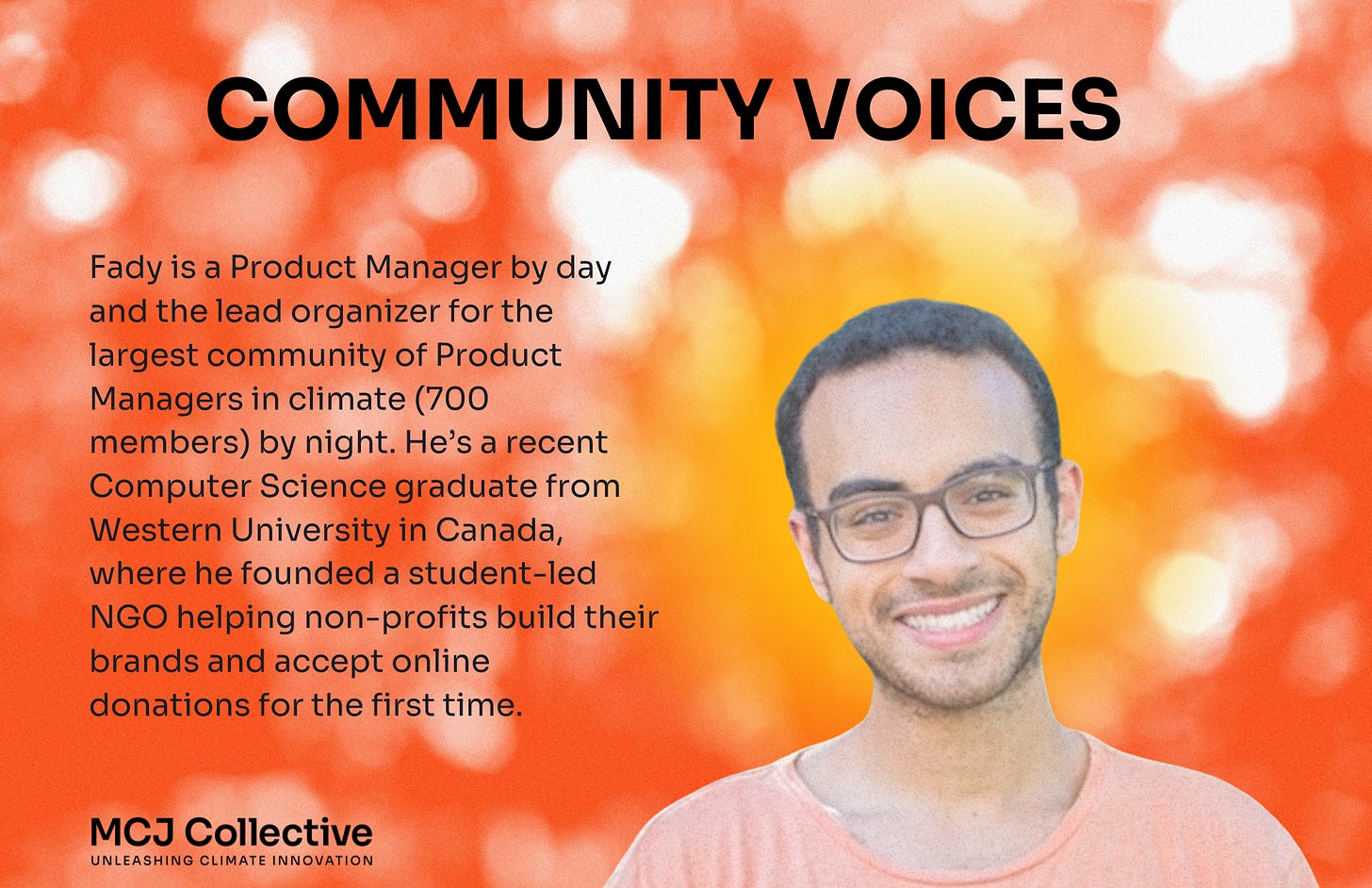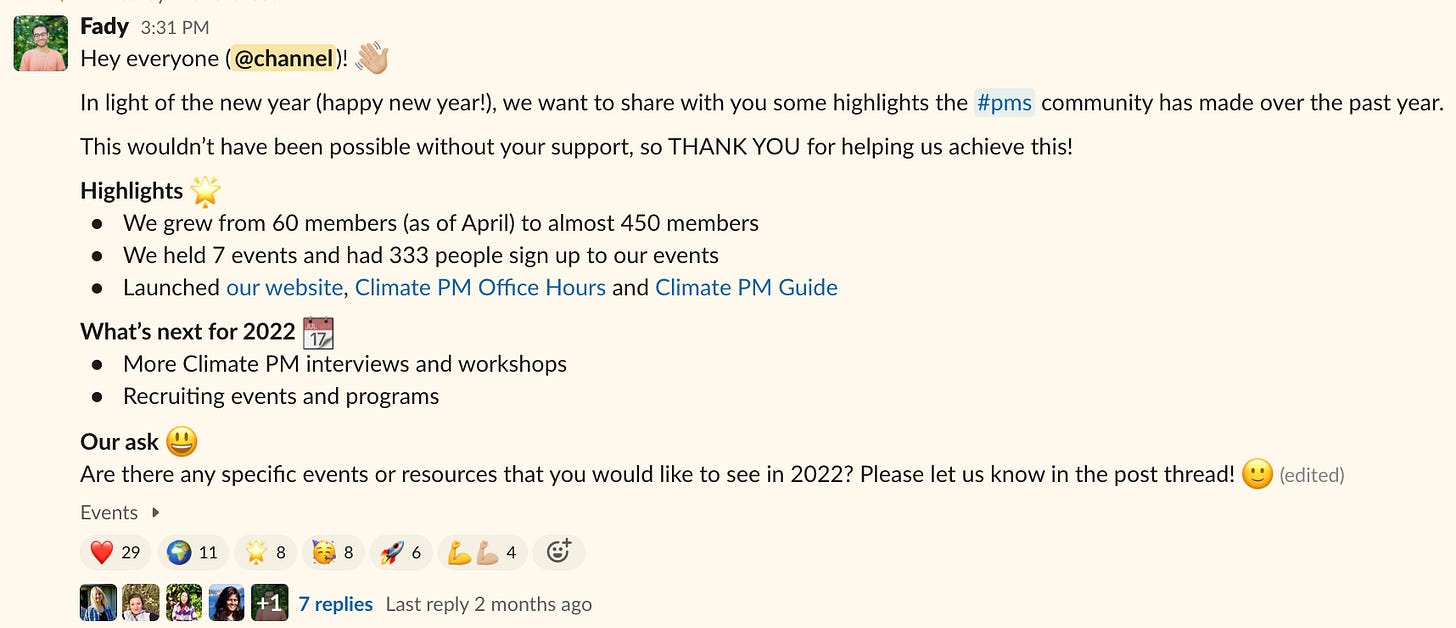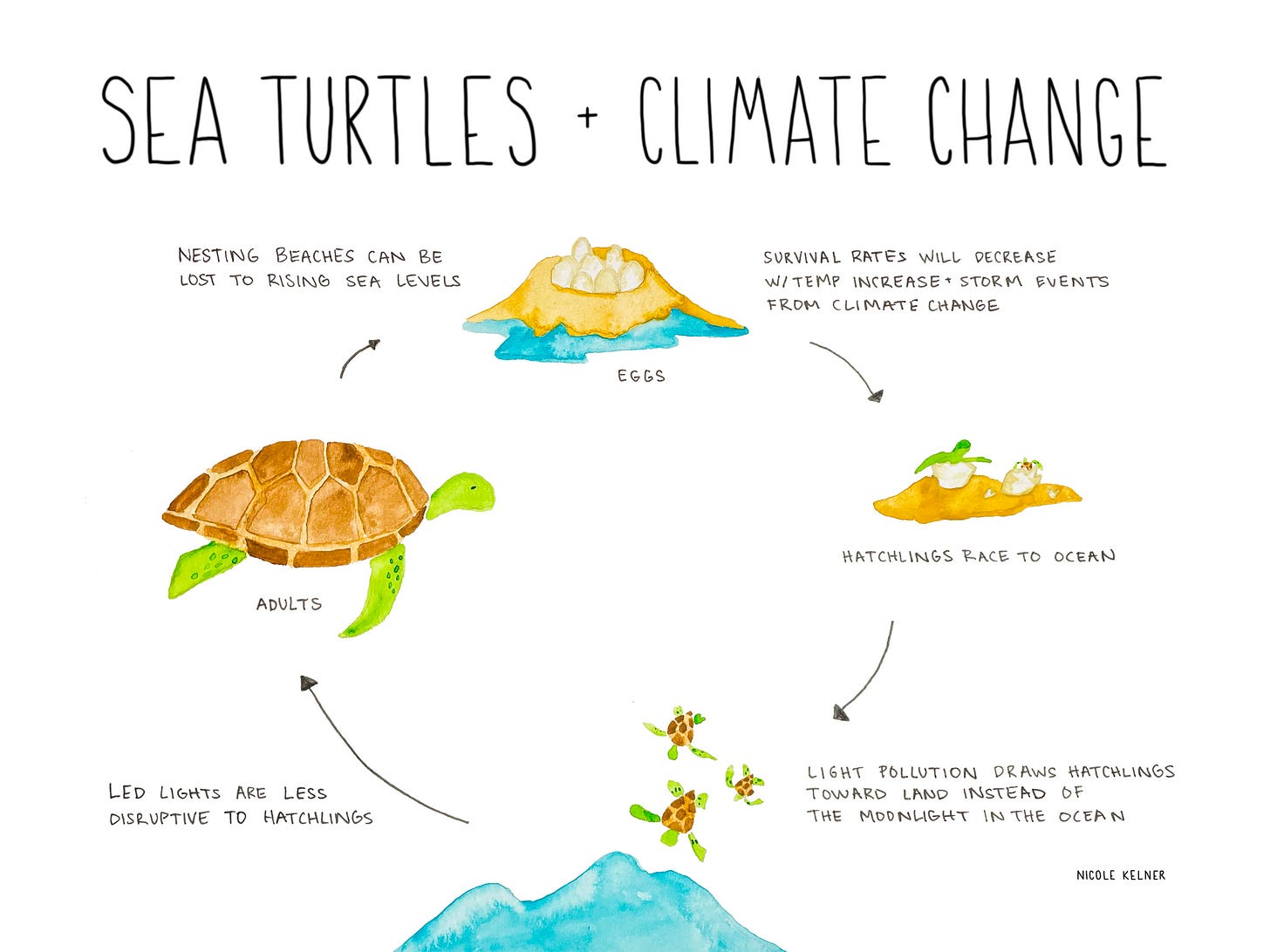Community organizing in climate, a case for early career professionals
By Fady Azmy
Building a community for myself and for others to work on climate issues was one of the best decisions I have ever made. Not only did I find my tribe, but I also helped others do the same all while gaining experience and picking up skills that were relevant to my career.
Much has been written about the benefits of volunteering to early-career professionals; however, little has been written about the advantages they have when it comes to community organizing. In fact, early-career professionals can both benefit from and add value to mission-driven communities.
What is community organizing?
Community organizing, defined loosely, is about bringing people together towards a common mission and empowering them to take action to achieve that mission.
A community thrives when its members:
develop their collective knowledge
communicate their needs to organizers
make progress towards their shared mission (e.g., work on climate issues)
Why do we need more community organizers in climate?
Although mitigating climate change is becoming increasingly urgent, working on climate-related issues is still far from mainstream. Many people just don’t know where to start.
Take the example of Mary (not real name), who joined the Work on Climate community in 2021. At the time, she was working at a well known consulting firm but was very eager to move into the climate space. She recently shared that if it were not for the community, she would have never moved into the climate-related role she is now in.
The Work on Climate community helped her find out about the position and — perhaps most importantly — helped her build the confidence to make the move. It provided her with a place where she could share her doubts and questions with people who can relate to her struggles such as people in the same place as her as well as those who were there previously and have since successfully built their careers in climate.
This is only one of many examples that illustrate the power of community organizing in climate. Until working on climate change issues has become mainstream, we urgently need more people to create such communities. And, as I will discuss below, you do not need to have worked in climate before to become a community organizer. In fact, you may even be better placed to build a community than more experienced folks.
Why are early-career professionals an excellent fit for community organizing?
When starting a career, people develop a standard set of interests that include:
Growing a network
Building domain knowledge
Developing skills aligned with their professional ambitions
Gaining relevant experience
By becoming community organizers, early career professionals can build on all of the above interests. And that’s not all. Communities can also benefit from being led by such early-career professionals, as they tend to:
Be less opinionated than senior professionals and more likely to encourage mutual rather than top-down knowledge-sharing
Have more time to dedicate to the community
Be more invested in the community given that they still have to prove themselves
Grow communities in a more organic and sustainable way given that they cannot rely on a pre-existing network
Are there limitations to community organizing if you are an early-career professional?
While this piece frames community organizing from a professional development lens, this should not be your only motivation. You may lose interest in the community mission once you have achieved your professional goals, which can be damaging to the community in the long run.
There are also some challenges that come with being an early-career professional in community organizing:
You don’t have a developed network, so you’ll rely on other people and their networks
You are not an expert (yet!), so you’ll need to constantly be learning about the industry
You may not seem credible to your community members so you’ll need to invest more time in building strong relationships with them before they trust your asks
From my experience though, I believe that the benefits of community organizing as an early career professional far outweigh its limitations.
My experience with the Product Managers climate community (700 members)
I joined the Work on Climate community because I couldn’t find role models and answer to my questions as a PM eager to work on climate issues. While I found the community helpful, I quickly realized that there was a lack of resources specifically tailored to PMs. The closest thing to what I needed was a small sub-community called PMs in Climate, but it was inactive. So I decided to revive it. And that was the start of my journey as a community organizer.
My biggest goal was to create a simple resource for PMs looking to work on climate issues. We created a PM Climate Guide, which captures all of our learnings and answers the most popular questions we’ve received. Since launching it, we’ve noticed that fewer of these questions are being asked in discussions. We also continue to welcome an increasing number of new members via word-of-mouth.
Looking back, I am so grateful that I got involved in community organizing. Not only did it help me further my knowledge in climate, I also made new friends, built an incredible team and honed skills that I intend on using in my career.
How can I get involved in community organizing?
Most of the climate communities I’ve seen are volunteer-run, so odds are that they are growing slowly and they are running lean. Reach out to the organizers (if any) and volunteer to help create resources/run an event that you wish existed. You can also offer to create a new subgroup that is underserved and fits your interests, or lead an inactive one as I did. Keep in mind that the organizers are likely stretched thin, so try to make a simple offer, which doesn't require too much support from them.
Some communities to consider joining to get you started are My Climate Journey, Work On Climate and Climate Action Tech. You can also choose to start your own community if you do not find any existing one that meets your needs. Best of luck!
📢 Climate Action of the Week
Want to do more? Sign up for the next Climate Changemakers Hour of Action here.
This past week, MCJ and Climate Changemakers put on MCJ Action with Adam McKay, an hour-long fireside chat and climate action session with the Academy Award-winning filmmaker who brought us the climate change-inspired satire Don’t Look Up in addition to The Big Short and Vice as well as Anchorman, Talladega Nights, Winning Time and many more films and shows.
During the event, McKay spontaneously committed to making a climate action phone call every day for 30 days, and he followed up with the same commitment on Twitter. Want to join Adam on his #30DayChallenge #30DaysofClimate effort? Our friends at Climate Changemakers have a great guide to make it easy to call your Senator with a personalized ask at https://www.climatechangemakers.org/call.
Here’s the full 60 minute video of Wednesday’s MCJ Action with Adam McKay:
✍️ The Draw-down
Weekly climate art! This week, we’re featuring Nicole Kelner, check her out on Twitter.
🔎 Fresh Takes
Each week, The Regenerates will surface a climate campaign or stories to be told—elevating why it works (or doesn't) from a communications and marketing lens.
After getting called out for a business model that’s actually worse for the environment than just throwing clothes away, Rent the Runway’s new campaign preaches slow-fashion principles — but is it really just a case of the emperor’s new clothes? Read more
🍿 The Leanback
Learn about Checkerspot this week with Pique Action’s mini-documentaries.
🎙 Startup Series
This week, Jason caught up with Dr. Anna Scott, co-founder and Chief Science Officer at Project Canary. Project Canary is a data analytics and environmental assessment company committed to accelerating the path to net-zero. They focus on methane emissions measurement and reduction, freshwater use, and community impacts for energy-intensive industries. Dr. Scott reviews her journey from researcher into entrepreneurship and shares how Project Canary’s methane measurement and analytics system is helping energy companies make the energy transition.
✨ Highlights
🤝 MCJ is hiring! We’re looking for a Content and Social Media Lead to focus on all things MCJ Podcast and newsletter! Check out the job description here.
🚨 Please take a minute to complete the quarterly Member Survey - Members received an email on Friday to compete a quick member survey. You can also find it here in the MCJ Slack.
👩💻 Climate Jobs
For more open positions, check out the #j-climatejobs channel in MCJ Slack.
Leap is seeking a Chief Product Officer among other positions
Phoenix Tailings is hiring a Head of People Ops among other positions
Dance has a number of open roles in Europe
Tender is hiring a Head of Strategic Operations among other positions
Patch is hiring Business Development Reps in North America and Europe
Google is hiring a Product Manager for Low Carbon Aviation
Mosaic Materials is hiring a Director of Materials Manufacturing
Noya is hiring a Technical Program Manager among other positions
Generate Capital is hiring a Salesforce Administrator among other positions
Charm Industrial is hiring a Project Manager among other positions
👉 Events
“How to Get a Job in Climate” (Virtual, Tuesday, April 26th, 12PM EST)
“The Future of Grid Energy Storage” (San Francisco, CA, Thursday, May 12th, 6PM EST)
Climate Voices is a free weekly email curating news, jobs, MCJ episodes, and other noteworthy happenings in the MCJ community.
💭If you have feedback or items you’d like to include, feel free to reach out.
🌳If you’d like to become an MCJ member, apply today!
📨If someone forwarded this to you, sign up!




